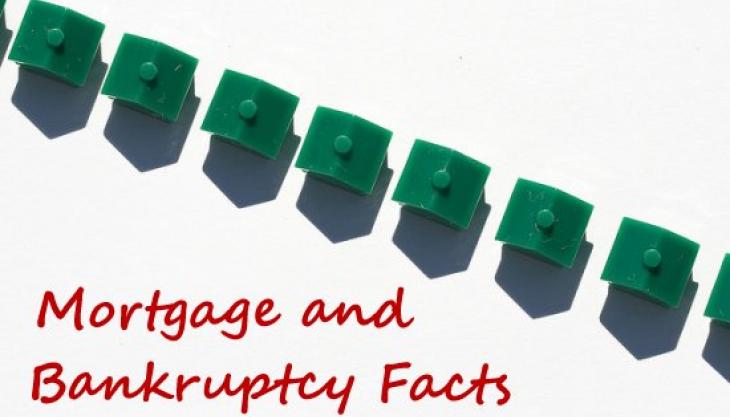7 Things You Must Know About Your Mortgage During Bankruptcy
Submitted by Rachel R on Fri, 08/28/2015 - 8:43am

What happens to your mortgage during bankruptcy?
Image Source: Flickr User woodleywonderworks
If you are deep in debt and struggling to stay head above water, you may want to consider Chapter 7 or Chapter 13 bankruptcy as a solution. If you own a home, you may think this is a barrier to bankruptcy because you might lose your home. You may have concerns if you're behind on payments, worry about your lender's reaction to the bankruptcy, and wonder what you can do to keep your home during bankruptcy. Here are seven things you should know about mortgage debt and bankruptcy.
#1 You must list your mortgage in your bankruptcy
Whether you're current on your bankruptcy or have fallen behind on your payments, you must list the mortgage among your debts in your bankruptcy petition. You can't exclude any debt from your bankruptcy – not your car loan, not your mortgage, not a credit card you want to try and keep – nothing. All debts must be listed, so the bankruptcy Trustee and Court have an accurate picture of your financial circumstances.
#2 You can protect significant equity in bankruptcy
In North Carolina, someone filing an individual bankruptcy can protect up to $35,000 in equity in a primary residence (i.e., the home you live in every day). If you are married and file with your spouse, you can protect up to $70,000 in equity according to NC bankruptcy exemptions. If your equity is less than these amounts, you should have no issues. If you have more equity than can be protected by the exemptions, a Chapter 13 may be preferable to a Chapter 7.
#3 You may want to sign a reaffirmation agreement for the mortgage
Signing a reaffirmation agreement for your mortgage can be beneficial in some cases. It is only applicable to Chapter 7 and, essentially, it pulls the mortgage out of the bankruptcy. The primary benefit of reaffirmation is that the mortgage company will continue to report your payments to credit bureaus which can help you improve your credit after the bankruptcy. If you are behind on your payments, you may not want to reaffirm. Consult your attorney before you sign!
#4 You should be vigilant when making future mortgage payments
Whether you sign a reaffirmation agreement or not, after you file your bankruptcy petition, you should chart your future payments. Why? If you didn't reaffirm, the mortgage company might not send you statements. If the bank later tries to foreclose for non-payment, it's up to you to prove to the courts that you made all your payments. Your lender may not allow you to make online or phone so you may have to resort to mailing checks.
#5 You should pay future mortgage payments in a manner that can be tracked
Your lender may cut off access to phone or online payments, but you need to be able to track and confirm payments. Consider sending payments via certified mail with delivery confirmation. Also, don't pay with a money order – you need to pay via check so you can track the date it was deposited by the lender. If you have to close your bank account during bankruptcy and can't get another, a service like Amex Blue Bird provides checks with their prepaid cards you can use to pay bills.
#6 You should consider whether you're better off not keeping the house
If you have little equity or negative equity and the payments are potentially unmanageable even after the bankruptcy, you should think carefully about whether the house is worth it. You may not want to keep it if...
- The house needs significant repairs
- Your mortgage interest rate is high
- You can't refinance
- The home is not a keeper for some other reason (declining neighborhood, too far from work, too small or large)
You should think carefully about giving it up in the bankruptcy, renting for a while, then buying again later.
#7 You should treat a first and second mortgage differently in bankruptcy
Know that first and second mortgages should not be weighed the same way in your mind during your bankruptcy. If you file Chapter 13, and there is no equity to support the second mortgage, you can often shed it during bankruptcy. For instance, if you have a home worth $150,000, with a $140k mortgage and a $20k second mortgage, you may be able to have it eliminated or reduced to the $10k equity balance. In Chapter 7, you can only get rid of the second mortgage if you also get rid of the first mortgage. If you are underwater because of two mortgages, you may want to unload both.
To find out more about the debt relief offered by North Carolina bankruptcy and your options for your mortgage while in bankruptcy, contact the Law Offices of John T. Orcutt. Call +1-833-627-0115 to schedule a free consultation in Greensboro, Raleigh, Fayetteville, Garner, Wilson or Durham.
Debts Hurt! Got debt? Need help? Get started below!
Serving All of North Carolina
- Bankruptcy Attorneys Raleigh NC (North)
- Bankruptcy Attorney Fayetteville NC
- Bankruptcy Attorney Durham NC
- Bankruptcy Attorneys Wilson NC
- Bankruptcy Attorneys Greensboro NC
- Bankruptcy Attorneys Southport NC
- Bankruptcy Attorneys Wilmington NC
Bankruptcy Attorneys Raleigh NC (North)
6616 Six Forks Rd #203 Raleigh, NC 27615 North Carolina
Tel: (919) 847-9750

Bankruptcy Attorney Fayetteville NC
2711 Breezewood Ave Fayetteville, NC 28303 North Carolina
Tel: (910) 323-2972

Bankruptcy Attorney Durham NC
1738 Hillandale Rd Suite D Durham, NC 27705 North Carolina
Tel: (919) 286-1695


Bankruptcy Attorneys Greensboro NC
2100 W Cornwallis Dr. STE O Greensboro, NC 27408 North Carolina
Tel: (336) 542-5993

Bankruptcy Attorneys Southport NC
116 N Howe St. Suite A Southport, NC 28461 North Carolina
Tel: (910) 218-8682

Bankruptcy Attorneys Wilmington NC
116 N. Howe Street, Suite A Southport, NC 28461 North Carolina
Tel: (910) 447-2987
